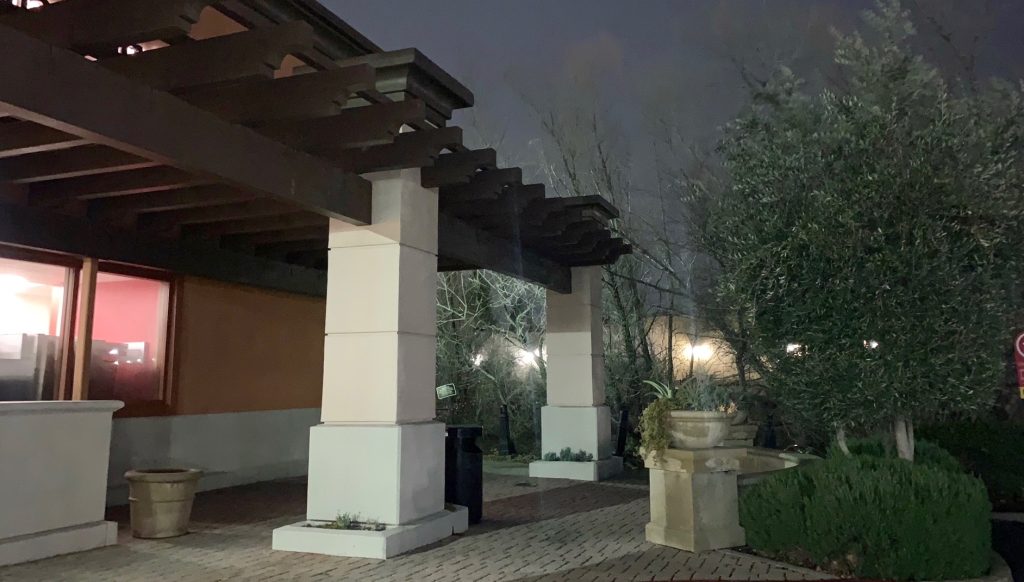Carson Schewe held to answer for selling lethal dose even after two people he cared for died
On a late winter afternoon, Kade Webb walked into a Safeway in East Roseville, began charging his cell phone at its Starbucks and then made two trips to its nearby restroom. On the 20-year-old’s second time through the bathroom doors, he started dying in one of the toilet stalls. It would be five hours before anyone realized.
When paramedics finally converged, they pulled Webb out into the narrow hall between the espresso bar and sales floor, attempting to revive him under florescent lights. Eventually, the young man was pronounced dead. His body was left on the floor with a yellow sheet over it as police arrived on the scene. Earlier that day, he’d told his father that he was stepping out for a haircut.
It was December 3rd, 2021.
A special investigations team from the Placer County Sheriff’s Department began looking into the incident. Its detectives learned that Webb, who’d recently left rehab, had come straight to the grocery store from an apartment complex on the side of the shopping center. That’s where his on-and-off again drug dealer Carson Schewe lived. Webb had been allegedly meeting with Schewe minutes before walking into the Safeway. Additionally, Sheriff’s detectives found that – at the time of Webb’s passing – his dealer was the target of an ongoing probe by the Roseville police Crime Suppression Unit. According to evidence presented in court on Feb. 23, there were numerous reasons the officers were watching Schewe, and they weren’t just because the 20-year-old was known to be prolifically peddling fentanyl disguised at Percocet around Roseville.
He was also someone who Death seemed to be following.
Just four months before Webb lost his life, Schewe’s estranged girlfriend Hailey Modesitt died of a drug overdose in Sacramento County. Eight months before that, Schewe’s best friend, Spencer Newsom, died of a pill overdose in Roseville. Among the things Modesitt and Newsome had in common was that they were both very young.
As Schewe’s preliminary hearing got underway, Judge Steven Howell heard testimony that losing his best friend and girlfriend did not to stop Schewe from selling more fentanyl-laced “percs.” Nor did those tragedies prevent Schewe from recording videos of himself thumbing through huge bands of cash while bragging about being “a trapper.” In one video, he can be seen laughing as hundred-dollar bills tumble out of his grip. “Oh shit!” he muses, “I can’t even hold it all!”
And the death of Kade Webb inside Safeway?
That reportedly didn’t stop Schewe from trafficking drugs around South Placer, either.
On Tuesday, Webb’s friends and family gathered at the Justice Center in Roseville to see if Schewe’s reported disregard for others’ futures amounted, legally, to “implied malice,” making him eligible to be charged with murder.
New tech, new drug, old game

The first investigator called to the witness stand was Placer County Sheriff’s Detective Patrick Craven. He began his testimony by offering context around a string of young people dying from fentanyl on his beat in the previous three years.
“Between 2019 and 2021, Placer County saw a 450% increase of death related to overdose,” Craven said, “2019 was a big jump up in our county.”
The detective went on to recall an early death he had investigated, that of Zachary Didier, whose mother Laura has been on a public awareness campaign ever since the 17-year-old expired in Rocklin from a counterfeit Percocet at Christmastime, 2020. In that case, Craven focused on an online transaction-trail that led through Snapchat, ultimately arresting 22-year-old Virgil Bordner for selling the teen “percs” cut with fentanyl. Bordner was convicted of involuntary manslaughter and sentenced to 17 years in state prison: He was given one year for every year that Didier had on earth.
During Schewe’s hearing, Placer County prosecutor Devan Portillo brought up Didier’s case.
“Did that really clue you in to the fact that Sapchat is now a platform widely used by dealers to sell these pills?” Portillo asked the detective.
“Yes,” Craven responded. “It is a perfect platform for individuals who want to sell narcotics based on the fact that it has encrypted backing to it, therefore, if a message is sent to an individual, that message is gone. So, even through the application of a warrant, the data that Snapchat has retained, that conversation is essentially gone.”
Craven went on emphasize Snapchat’s geo-location features.
“In addition to that, it broadens the scope of people who would be able to acquire drugs,” he noted. “Dealers on Snapchat will tag a location and essentially post up a menu of what they’re selling. For instance, one could say like the Galleria, which is a highly populated area where there’s a lot of youth and people who have cash …. A dealer could tag their menu to that location, and then a buyer would look at that location because it would come up in their feed, as a story, that was posted from that location – and what that does is it forms a connection that otherwise would not have ever arrived.”
Regarding Schewe, Craven testified that, after Webb died, two of his friends in addiction recovery started texting the dealer to see what had happened. Craven was able to obtain screenshots of those exchanges. In one, Schewe assures Webb’s pal that he had nothing to do with the calamity, though he predicts that law enforcement won’t be pursuing the truth about it either way: Schewe invokes the names of his dead girlfriend, Hailey Modesitt, and dead best friend, Spencer Newsom, as evidence of his theory in a text later read aloud in court.
“Nah, hella people sell percs around here, and I assume the dude who slid him the shit at Starbucks gave him percs,” Schewe wrote, referring to some Safeway surveillance footage that South Placer’s pill scene was chatting about. “If no one knows [Webb’s] pass code, the cops can’t get into it. Apple has a strict thing on that – look it up.”
Schewe then sent over a screen-shot of an internet search titled, “Can cops get into an iPhone?”
Schewe concluded the thread, writing, “They won’t send it to a crime lab since it’s an overdose and people overdose every day: It’s sad … Sad as fuck. Cops probably don’t even really care cause it’s an overdose and people overdose every day, and they deal with it every day. They never found who gave Spencer the percs … and Hailey, they had her password and still didn’t find the guy. They don’t care about overdoses.”
But two things were clear from the testimony in court: The cops in Placer County did care; and – with a warrant and assistance from Webb’s family – they’d accessed the latest overdose victim’s phone. Craven testified that, from there, they used cellular activity and Uber data-points to track Webb on the day of his death directly to Schewe’s apartment. Immediately after that, they could see Webb’s phone moving to the Safeway and bathroom where he ultimately died.
A “cellbrite” program also allowed investigators to find Snapchat messages between Webb and Schewe. While the Snapchat app makes exchanges generally vanish, either recipient can choose to save them. Craven explained on the stand that one of them had.
Seventeen days after Webb died, Craven’s team executed a search warrant on Schewe’s apartment.
In court, Portillo showed photographs indicating that detectives found 73 counterfeit Percocets that turned out to be fentanyl, along with a digital scale and videos that Schewe took of himself holding piles of money. In one video, in which Schewe repeatedly uses the N-word, he brags about holding $3,000 in cash in his hand.
“I made this in like three days,” he chuckles.
Initially, Schewe was only arrested for drug-trafficking. He posted bail ten days later. But, according to the next witness, he returned to setting up drug deals right away.
After Roseville Police Detective Richard Rahn was sworn in, he recounted that for some time before Webb died Schewe was already on his radar. He’d allegedly developed information that the young man was a known fentanyl dealer in South Placer County. Rahn began his testimony by explaining why that matters.
“It’s two-to-three milligrams of fentanyl that’s considered a lethal dose for a non-opioid-dependent user,” Rahn detailed. “When we’re talking about the miligrams of the pills, I like to talk about what an ounce looks like, so an ounce of product is 25.5 grams … A pencil weights approximately an ounce. So, if you’re saying that two milligrams is a lethal dose of fentanyl … then one pencil – one ounce of fentanyl – in relation to the citizens of Roseville, per the 2022 census, would be enough fentanyl to kill approximately 10% of the population of Roseville.”
A pregnant survivor’s undercover call, a detective’s undercover bust

Webb’s death on the bathroom floor left a lot of people heartbroken. One of them was Brooklyn Billick, his girlfriend who was 9-months-pregnant with their child. Part of Craven’s investigation included meeting with her. The detective testified that Billick was not supportive of Webb’s addiction and was fingering Schewe as the dealer who likely supplied it. Billick had even observed Webb setting up a pill-purchase with Schewe in the past through Snapchat, with latter using the handle BNO. Craven asked Billick if she’d phone the suspect on a line that was being recorded. She agreed. Billick was dialing the number ten days after her boyfriend’s death.
During the hearing, that entire call was played in court.
“Oh shit, how are you doing?” Schewe asked when Billick identified herself. “I’m so sorry to hear about your loss.”
“I just wanted to clear some things up because I have a lot of questions,” Billick told him. “I know you guys hung out that night, and I’m just wondering if you gave him what he had?”
“I don’t even know what night you’re talking about,” Schewe stammered. “I’ve been in Florida for the last month in rehab myself, battling addiction, and I’ve probably been back for not even a month, and I haven’t really seen anyone … I haven’t even had social media on my phone.”
“Carson, can you not lie to me, please?” Billick cut in. “I was on his phone, and I know his Snapchat, and I saw that you guys were hanging out.”
“That’s the thing where you’re wrong, I don’t even have a Snapchat,” Schewe said quickly.
“Yeah, you do, Carson,” Billick shot back. “Why did he go to your house? I have to raise my kid alone now because of you – you were the last person to see him … Listen, I know his locations, he and I were very close.”
Schewe can be heard profusely denying he’d seen Webb, repeatedly claiming he didn’t have a Snapchat account.
“I don’t want a whole story, I just want you to be honest with me,” Billick countered. “I have to live with this my whole life – I have his baby inside me and I give birth in two weeks. I just want the truth … Now, you’re just lying to me. You’re just lying. I’ve seen you leave his house after dropping stuff off. I’ve watched you do it, and it’s the same fucking Snapchat that he was talking to this time, which means that it was you.”
“I’m not trying to argue with you over this,” Schewe replied, sounding flustered. “I don’t know, Brooklyn. I have no clue, and I really don’t know what you’re trying to get at it. I don’t even have Snapchat on my phone … I don’t have a drug-dealing Snapchat. I don’t even have a personal Snapchat.”
“BNO was your stupid user name,” Billick vented. “Why would someone take your user name and try to imitate you?”
“I wish there was something I could do to help you,” Schewe muttered.
When Billick tried to get Shewe to confirm his address, the other refused.
“What do you think I’m going to do? My whole-ass pregnant self is going to come to your house?” Billick fumed. “Ok, I’m done – I’m done talking to you.”
If Schewe was rattled by the call, it reportedly didn’t give him pause about plying his trade. According to Detective Rahn, despite the series of deaths, the verbal confrontation with Billick and his recent trafficking arrest, Schewe was soon announcing through Snapchat that he was “open for business” again. Rahn said that he contacted Schewe using an undercover online identity. Messages presented in court show the two discussing a drug buy on New Year’s Eve.
“Yeah, bruh, not really, they really tried to get me locked up for a few years,” Schewe messaged Rahn, assuming he was a Percocet addict. “Twenty undercover cops were in my house, searching it, ten cars pulled up on me – hopped out with guns.”
Rahn messaged back, “That’s like the movies.”
On February 10, 2022, Rahn pulled up near Schewe’s apartment, dressed in street clothes and behind the wheel of an unmarked vehicle. He testified that Schewe hopped in cab with him and sold him pills.
Schewe found himself in bracelets again.
Implied Malice

This afternoon, Portillo and Schewe’s defense attorney, Victor Haltom, made their closing arguments about whether or not the defendant should face literal murder charges.
“The fact that the fentanyl caused Kade’s death is undisputed – it’s the only competent evidence before the court,” the prosecutor asserted. “In this case, the question is, did Mr. Schewe know his conduct is dangerous to others, but didn’t care and did it anyway?”
Portillo immediately brought up the two young people in Shewe’s orbit that were killed prior to Webb.
“He was the main suspect in both Spencer’s death and Hailey’s death,” Portillo stressed. “Months before he sold the drugs to Kade that killed him, he knew that selling drugs could result in murder … We’re talking about an unbroken chain between Mr. Schewe and Kade Webb.”
The deputy district attorney ended on a broader note.
“We have an actual poison causing a real pandemic in Placer County,” Portillo said. “He knew what he did caused Kade’s death, and he was running from it – and he can’t run from it anymore.”
During the Defense’s argument, Haltom expressed frustration about the media’s inaccurate reporting of the case thus far. Specifically, the attorney was referring to claims that Webb didn’t know his “percs” were counterfeit.
“Mr. Webb knew what he was obtaining from Mr. Schewe: He’d asked for fentanyl – he’d begged for it,” Haltom countered. “They were both dealing above board and they knew the substance they were dealing with.”
Haltom’s direct argument against implied malice in the case equaled a concern that the Placer County D.A. was inventing laws that don’t actually exist on the books.
“Really what the prosecution is doing in this case is trying to squeeze drug dealing into murder – and simple drug dealing is not tantamount to murder under the law in California,” Haltom offered. “To accuse Mr. Schewe of murder is twisted and bizarre … Yes, there is a horrible rash of fentanyl overdoses taking place in Placer County right now, and that gave rise to this … There’s a tremendous amount of political pressure – the officers feel it – but the answer is not to take it out on Mr. Schewe.”
After spelling out his reasoning, Howell ruled that Schewe would indeed be held to answer for murder.
When the judge asked Portillo about his thoughts on allowing Schewe to post bond while he awaited trial, the prosecutor answered, almost in a whisper, “No, he’s a menace to the community.”
Scott Thomas Anderson is also the writer-producer of the true crime podcast series, ‘Trace of the Devastation.’


Good on Placer County law enforcement for taking a creative approach to hang a murder rap around Schewe’s neck. Takes guts, but implied malice just might work in this case because Schewe’s attitude towards his victims was so despicable.
Excellent reporting. In my opinion, this site is currently the best at reporting local news. You might consider throwing them a buck or two. They are looking out for the community.